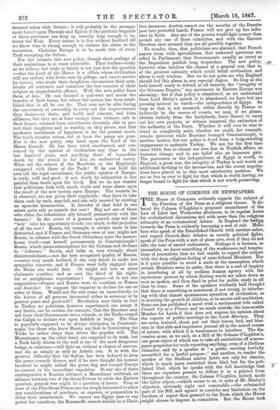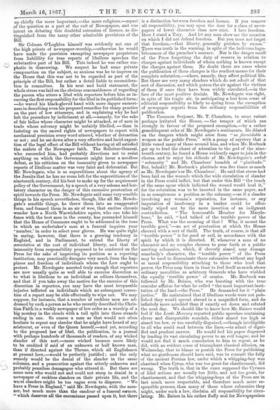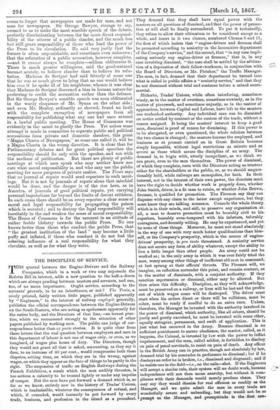TEE HOUSE OF COMMONS ON NEWSPAPERS.
THE House of Commons evidently regards the subject of the Freedom of the Press as a religious theme. It de- bated Sir Colman O'Loghlen's proposed amendment of the Law of Libel last Wednesday afternoon, in its regular hours for ecclesiastical discussions and with more than the religious solemnity of an ecclesiastical debate. In England the feeling towards the Press is evidently becoming a sort of cult. Mel- berg who speak of the Established Church with careless satire, and regard Church-Rate debates as merely political fights, speak of the Press with a sort of pious awe, even if they do not take the tone of sacred enthusiasm. Perhaps it is because, as journalists, we know something of the weaknesses and tempta- tions of journalists, that we feel unable to regard the subject with the deep religious feeling of some Liberal Members. Nor is it quite possible to avoid a smile at the assumption which certain Members seem to make, that there is a sort of impiety in interfering at all by reckless human agency with the mysterious process by which fleeting words are taken down as soon as spoken, and then fixed in print for public study in all time to come. Some of the speakers evidently half thought that there is something as unnatural, if not wrong, in interfer- ing with that almost spontaneous operation of civilization, as- in stunting the growth of children, or in ascetic self-mutilation. Some one has published a novel with a sentimental title called Cometh Up as a Flower, and we much mistake the honourable Member for Leeds if that does not express his opinion about the reports of public meetings in the Leeds Mercury. They are sown, fostered, shoot, pat out their leaves, bud, and blos- som in that able and impressive journal all in the sacred course of nature, with which it is wantonness to interfere. The dis- cussion arose, as we said, on a Bill of Sir Colman O'Loghlen's, one great object of which was to take all restrictions off a news- paper proprietor for truly reporting anything, even of a libellous character, said by a speaker at "a public meeting lawfully assembled for a lawful purpose ;" and another, to render the speaker of the libellous matter liable not only for slander, which is much more restricted than libel, but for the pub- lished libel, which he speaks with the full knowledge that there are reporters present to diffuse it in a printed form throughout the country. Sir Colman O'Loghlen, indeed, made the latter object,—which seems to us, in spite of Mr. Henley's objection, obviously right and reasonable,—the substantial part of his Bill, and agreed to consider any limitation on the freedom of report thus granted to the Press which the House might choose to impose, in committee. But the House took up chiefly the more important, —the more religious,—aspect of the question as a part of the cult of Newspapers, and was intent on debating this doubtful extension of licence, as dis- tinguished from the many other admirable provisions of the Bill.
Sir Colman O'Loghlen himself was evidently not one of the high priests of newspaper-worship,--otherwise he would have made the provision exempting newspaper proprietors from liabilility for true reports of libellous speeches the substantive part of his Bill. This indeed he was rather em- phatic in disavowing. We suspect he had some private compunction on the subject, so anxious was he to impress on the House that this was not to be regarded as part of the principle of the Bill, but rather a detail liable to reconsidera- tion in committee. In his neat and lucid statement, the whole stress was laid on the obvious reasonableness of regarding the person who utters a libel with reporters before him as in- curring the first responsibility for the libel in its published form; —he waved his black-gloved hand with more dapper earnest- ness in describing even his proposed remedies for sharp practice on the part of low attorneys, and in explaining why he had left the procedure by indictment at all,—namely, for the sake of fair ladies whose character might be attacked, or of men in trade whose solvency might be unfairly libelled, — than in insisting on the sacred rights of newspapers to report with mechanical precision every word uttered, whether of detraction or not ; and he sat down after a very effective and lucid exposi- tion of the legal effect of the Bill without having at all satisfied the zealots of the Newspaper faith. The Solicitor-General, who succeeded him, had probably directions not to resist anything on which the Government might incur a needless defeat, as his criticism on the immunity given to newspaper reports of libellous matter was very faint and deferential. But Mr. Newdegate, who is so superstitious about the agency of the Jesuits that he has no room left for the superstitions of the nineteenth century, did his best to make up for the acquiescent policy of the Government, by a speech of a very solemn and hor- tatory character on the danger of this excessive prostration of spirit towards the Press. Mr. Newdegate said some very sensible things in his speech nevertheless, though, like all Mr. Newde- gate's sensible things, he threw them into an exaggerated form, and framed them in an air of woe, that excites chronic wonder how a North Warwickshire squire, who can take his fence with the best men in the county, has persuaded himself that the House of Commons ought to be addressed in the tone in which an undertaker's man at a funeral inquires your
number,' in order to select your gloves. He was quite right in saying, however, that there is a growing tendency in England, and in Parliament, to extend the liberty of association at the cost of individual liberty, and that the immunity from responsibility proposed to be conferred on the Press for the sake of improving its position as a reporting institution, may practically derogate very much from the hap- piness and freedom of individuals whom the Law ought to protect. Mr. Newdegate asserted truly enough that reporters are now usually quite as well able to exercise discretion as to what is libellous to an individual as editors themselves, and that if you take away the motive for the exercise of this discretion in reporters, you may have the most irreparable injuries inflicted on individuals which no subsequent correc- tion of a report may be able effectually to wipe out. We may suppose, for instance, that a number of reckless men are ad- dressed by such a person as he who recently described the Chris- tian Faith in a weekly newspaper of low order as a worship of a big monkey in the clouds with a tail split into three strands ending in one. So coarse a man as that would not often hesitate to repeat any slander that he might have heard of any aristocrat, or even of the Queen herself,—and yet, according to the proposed law of libel, the publication, in a journal with perhaps hundreds of thousands of readers, of any wicked slander of this sort,—more wicked because more likely to be credited if said of an unknown or half known man, than if directed against the Throne, which all Englishmen at present love,—would be perfectly justified ; and the only remedy would be the denial of the slander in the same columns, and a prosecution against the utterly unknown and probably penniless demagogue who uttered it. But there are some men who would not and could not stoop to denial in a newspaper of reckless slanders on their private life, and the worst slanders might be too vague even to disprove. "We have a Press in England," said Mr. Newdegate, with the man- ner, but much more than the candour of a funeral sermon, "which deserves all the encomiums passed upon it, but there is a distinction between freedom and licence. If you -remove all responsibility, you may open the door for a class of news- papers of lower character than now exist. I love freedom. Here I stand a Tory. And let any man show me the occasion on which I did not defend freedom. But you must not forget. that freedom,—that liberty, generally perishes by excess." There was truth in the warning, in spite of the ludicrous lugu- briousness of the preacher's manner. Nor is the danger small of the Press forgetting the duty of reserve in relation to charges against individuals of whom nothing is known except the charges against them. No doubt there are cases where the publication of these charges is the readiest means for their complete refutation,—where, namely, they affect political life. But there are very many slanders which do not admit of that sort of discussion, and which poison the air against the victims of them if once they have been widely circulated,—in the face of the most positive denials. Mr. Newdegate was right, in spite of his tragic air, in anticipating a less keen sense or editorial responsibility as likely to spring from the exemption, of newspaper reports from the ordinary responsibilities of publication. The Common Serjeant, Mr. T. Chambers, to some extent- perhaps irritated the House, — the temper of which ran strongly in favour of the proposed exemption,—by a rather grandiloquent echo of Mr. Newdegate's sentiments. He dilated on the dangers which might arise from "so formidable a weapon as the public Press," with a pomp of mystery that a little vexed many of those around him, and when Mr. Roebuck got up to lead the chant of adoration to the god of the nine- teenth century, he found a House evidently eager to join in the' chorus, and to enjoy his ridicule of Mr. Newdegate's awful+ " solemnity" and Mr. Chambers' breadth of "platitude." But, behold! Mr. Roebuck's platitude was five times as much as Mr. Newdegate's or Mr. Chambers'. He said that stress had been laid on the wounds which the wide circulation of slander in the Press could inflict, but that under this Bill "the touch of the same spear which inflicted the wound would heal it' for the refutation was to be inserted in the same paper, and in as conspicuous a position as the calumny,—as if a slander involving any woman's reputation, for instance, or any imputation of insolvency in a banker could be effec- tually wiped out by the mere insertion of an indignant contradiction. "The honourable Member for Maryle- bone," he said, "had talked of the terrible power of the Press. What was the meaning of that ? Why, it meant the terrible good,"—an act of prostration at which the House cheered with a sort of thrill. The truth, of course, is that all "terrible power" is for good or evil, in accordance with the- spirit by which it is directed. If, whenever a man of no. character and no scruples chooses to pour forth at a publie meeting calumnies, which, if cleverly aimed, may damage somebody's character, the "terrible power" of the Press may be used to disseminate these calumnies without any legal or moral responsibility attaching to those who lend that power, the Press may learn in time to feel itself as much above ordinary moralities as arbitrary Generals who have wielded the equally terrible power' of armies. Mr. Roebuck was followed by Mr. Baines, who was bursting with the trues oracular afflatus for what he called "the most important insti-- tution of the land—the Press." He demanded for it "plain- justice." He maintained that if libellous words were not pub- lished they would spread abroad in a magnified form, and do- infinitely more mischief than if exactly set down and refuted the next day. We should like to know how Mr. Baines would feel if the Leeds Mercury reported public speeches containing clever and disreputable scandals, either aimed too high or aimed too low, or too carefully disguised,—though intelligible to all who could read between the lines,---to admit of digni- fied and prudent answer. He would feel his paper disgraced by lending its vast circulating power to an evil tongue, and he would not find it much consolation to him to repeat, as he did, with an evident sense of triumphant classical allusion, on Wednesday, that to blame or punish the Press for publishing what no gentleman should have said, was to commit the folly of the ancient Persian law, under which a whipping-boy was chastised when Cyrus, who was too great for chastisement, did wrong. The truth is, that in the cases supposed the Cyrusea of libel actions are usually too little, and not too great, for chastisement, and that the whipping-boys of the Press are in fact much more respectable, and therefore much more re- sponsible persons, than many of those whose calmunies they might, under such a law, disclaim all responsibility for circu- lating. Mr. Baines in his rather fluffy zeal for Newspaperism seems to forget that newspapers are made for man, and not man for newspapers. Sir George Bowyer, strange to say, seemed to us to make the most sensible speech of the debate, perfectly discriminating between the far more direct responsi- bility of the utterer of a public slander, and the much less but still grave responsibility of those who lend the power of the Press to its circulation. He said very justly that the former is often unpunishable, and sometimes even unknown ; that the refutation of a public accusation, however complete, —and it cannot always be complete—seldom obliterates it. There is much greater willingness, said the good-natured baronet acutely, to believe slander than to believe its refu- tation. Madame de Sevigne had said bitterly of some one that he was so much given to lying that no one would believe him even if he spoke ill of his neighbour, whence it was clear that Madame de Sevigne discerned a bias in human nature for preferring to credit the accusation rather than the defence. But Sir George Bowyer's sensible speech was soon obliterated in the wordy eloquence of Mr. Synan on the other side ; and even Mr. Henley, ordinarily so shrewd, found no fault with the complete exemption of newspapers from all responsibility for publishing what any one had once uttered in a lawful public meeting. The House of Commons was evidently in the mood to glorify the Press. Yet unless some attempt is made in committee to separate public and political -accusations from private and domestic slanders, this great "Magna Charts of Newspapers," as some one called it, will be a Magna Charta in the wrong direction. It is clear that for Parliamentary debates and for great political speeches the responsibility should lie only with the speaker, and not with the medium of publication. But there are plenty of public meetings at which men speak who may neither know nor care what moral responsibility is, and who may use the public meeting for more purposes of private malice. The Times says that no journal of repute would send reporters to such meet- ings. But it is not by journals of repute alone that mischief would be done, and the danger is of the rise here, as in America, of journals of good political repute, yet carrying personal imputations far beyond the limits of decent criticism. In such cases there should be on every reporter a clear sense of moral and legal responsibility for propagating the poison which is secreted ; and to destroy the legal responsibility will inevitably in the end weaken the sense of moral responsibility. The House of Commons is for the moment in an attitude of rather feeble idolatry towards the public Press. No one knows better than those who conduct the public Press, that "the greatest institution of the land" may become a little puffy and inflated, if those who conduct it do not feel the sobering influence of a real responsibility for what they circulate, as well as for what they write.
































 Previous page
Previous page